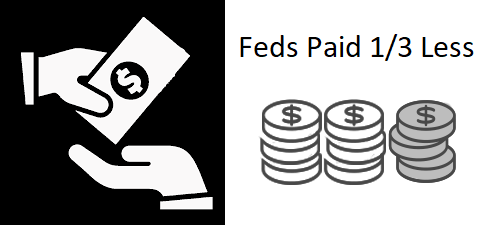Federal Employees Underpaid: 32% Less than Private Sector
Federal Salary Council Recommendations & Locality Pay Areas
The Federal Salary Council has announced that federal employees make about 32% less than employees in the private sector make. This is not a new event. The Salary Council issues a report each year than federal employees are dramatically underpaid compared to the private sector. The Council is also recommending more locality pay areas for federal employees.
While the latest report has not been issued, chances are it will not take note of other studies that show their recommendations are dramatically different from other studies such as the one by the Congressional Budget Office.
Adding new locality pay areas is also not a new recommendation. The Council routinely recommends new pay areas, new ways of calculating which employees are in a pay area, and new ways of calculating how to increase federal employee pay.
The advantage of adding locality pay areas is that this process does not have to go through Congress. But, adding new locality pay areas cannot be unilaterally decided by the Salary Council which essentially acts as a voice for increasing pay consistent with the desires of the unions on the Council. The recommendations have to be approved by the President’s Pay Agent. That process puts the breaks on many or most of the salary council recommendations.
Pay Recommendations by Republican Budget Committee
The Republican Study Committee has submitted its budget recommendations and a number of topics would directly impact the federal workforce. The press release accompanying the budget stated:
Federal bureaucrats have enormous power over the lives of everyday Americans and also get paid more on average than the people they are supposed to serve. According to CBO, “Overall, the federal government paid 17 percent more in total compensation than it would have if average compensation had been comparable with that in the private sector, after accounting for certain observable characteristics of workers.”
Unlike most Americans, federal workers receive an automatic pay increase every year under the Federal Employees Pay Comparability Act of 1990. If the president determines that a national emergency exists, he can limit the size of the increase. President Obama signed legislation blocking pay increases in 2011, 2012, and 2013. However, with the national debt increasing above $21 trillion, and projected to skyrocket to almost $34 trillion over the next decade, a fiscal state of emergency exists. Beginning in FY 2019, the annual across-the-board increase for federal workers should be reduced by half a percentage point below the expected automatic increases.
There is no reference to the Federal Salary Council recommendations.
The recommendations in this proposal are similar to the president’s budget proposal which calls for a pay freeze in 2019.
Likely Outcome on 2019 Federal Employee Pay Raise
The news headlines about the conclusion that federal employee pay is about 32% behind the private sector generates headlines in articles written for the federal community. The headlines generated favorable comments from many in the community who strongly believe the federal workforce is significantly underpaid.
The reality is that the Salary Council recommendations are often seen as self-serving and not taking into account the federal employee benefits that make up part of the compensation package.
Whether the Salary Council conclusions are valid or not, the reality is that if there is a federal pay raise in 2019 it will be a very small one. While there is a cadre of Democrats in Congress with a large number of federal employees who vote in their district who will routinely “fight for” a large pay raise, that is unlikely to happen. See, for example, Legislation Calls for 3% Pay Raise in 2019 which was not brought to a vote in the House.
It is more likely that there will not be a pay raise in 2019. Congress may, of course, approve a raise in any amount. If it does so, it is likely to be two percent or less.
In recent years, Congress has deferred to the president in determining the final amount of any pay raise. In 2018, the new pay rates were an average of 1.9% percent (including the amount for locality pay). The final amount approved was consistent with what the president had approved earlier in the year.
Federal employees work in a political environment. Republicans control Congress and the White House. Federal employee unions routinely support Democrats running for office and are sometimes seen as a political adjunct to the opposing party by Republicans. Several unions work on the Federal Salary Council and their work significantly influences the recommendations. The Council’s recommendations are unlikely to persuade Congress to approve a large pay raise.
New Locality Pay Areas to be Implemented?
It is more likely that Burlington, VT and Virginia Beach, VA will be included in new locality pay areas. This recommendation has been around for a couple of years.
Including these locations has been approved by the President’s Pay Agent, although the timing of when they will be included is still not known. OPM could move out with including these in a new rulemaking action if they are to be included in the 2019 locality pay areas. Or, alternatively, they could wait until the President’s Pay Agent makes a more specific determination about the timing and they will be delayed until the following year. The Pay Agent report is normally issued late in the year and there would not be sufficient time to include them in 2019 if no rulemaking actions have been initiated.
In short, whether new locality pay areas will be added is also unknown for now. There is no evidence of the administration being in a hurry to take action. With a new OPM director now in place, it is possible we will see some movement on these locality pay areas.
Legislation Calls for 3% Pay Raise in 2019
FedSmith, January 12, 2018
https://www.fedsmith.com/2018/01/12/legislation-calls-3-pay-raise-2019/
Legislation has been introduced in both the House and the Senate that would give federal employees a 3% pay raise in 2019.
The House version (H.R. 4775) was introduced by Congressman Gerry Connolly (D-VA), and the Senate version (S. 2295) is sponsored by Senator Brian Schatz (D-HI). The language of the bill stipulates that for calendar year 2019, the rates of basic pay would be increased by 2%, and locality pay rates would increase by 1% to create the 3% total.
Known as the Federal Adjustment of Income Rates (FAIR) Act, it is a bill that both lawmakers have teamed up to introduce each year since 2014. Last year, for example, the bill called for a 3.2% pay raise for federal employees in 2018. The year before that, it called for a 2017 raise of 5.3%.
Neither pay raise materialized, however. As readers are no doubt aware, the average pay raise in 2018 turned out to be 1.9%. In 2018, it was an average of 2.1%.
A Pay Freeze in 2019?
While some federal employees might feel a 3% raise in 2019 is too low, it would be much better than the rumored alternative: no raise at all.
Rumors surfaced recently that the Trump administration was considering a pay freeze for the federal workforce in 2019. The news came from an Office of Management and Budget document that was leaked by a whistleblower. A statement in the document said, “The President’s FY 2019 budget proposal will seek a government-wide pay freeze for all civilian federal employees…”
It is too early to know, of course, what 2019 will bring in terms of a pay raise. In the meantime, you can see what your 2018 salary will be with the 1.9% average raise that went into effect at the start of the year with our GS Pay Calculator.
NFFE
National Federation of
Federal Employees
Chicago, IL
2 Articles
Below

